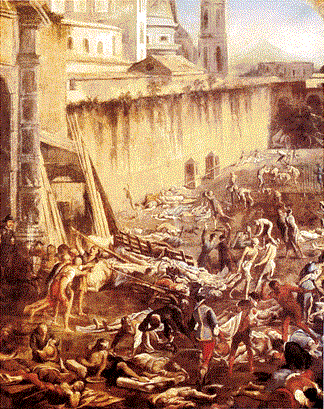The Bubonic Plague (The Black Death)
Flea greatly magnified. . . .
- The Plague began about 1331 in the grasslands of Central Asia. The Plague is found in rodents like ground squirrels and rats, but it is spread to humans through the bites of fleas living on infected rodents. The fleas had found their way into the caravans of the traders. It spread rapidly as people tried to escape along the trade routes of the steppe. The same Mongol law and order that made possible a century of trade and intense human exchange between China and the Atlantic coast, now quickened the progress of the plague across Eurasia. In China the outbreaks of the plague caused massive death rates and economic chaos. Italian ships carried infected rats and fleas in their cargo to the major European cities of the Mediterranean. The plague reached Egypt in 1347. One Egyptian historian tells of a ship: out of a total of 332 on board, only 45 arrived at the port of Cairo alive. All of those who had survived died soon after in the port. [Dols, The Black Death in the Middle East, p. 69]
- European painting showing the Plague.

From the sea ports caravans unknowingly transmitted the disease throughout Europe, northern Africa, and the Middle East. Estimates of the death tolls vary between 1/2 to 1/3 of the populations.
Ibn Battuta, the 14th century Muslim traveler from Morocco, told about the effects of the plague in Damascus, Syria where the death toll was 2,000 people a day! The business of the city had come to a halt. The people begged God for the plague to stop.
"The people fasted for three successive days... [Then all the people] assembled in the Great mosque until it was filled to overflowing... and spent the night there in prayers... Then, after performing the dawn prayer..., they all went out [barefoot] together... carrying Qur'ans in their hands. The entire population of the city joined... The Jews went out with their book of the law and the Christians with the Gospel... [all] of them in tears... imploring (begging) the favor of God through His Books and His Prophets." [Gibb, Ibn Battuta, p. 143-144]
